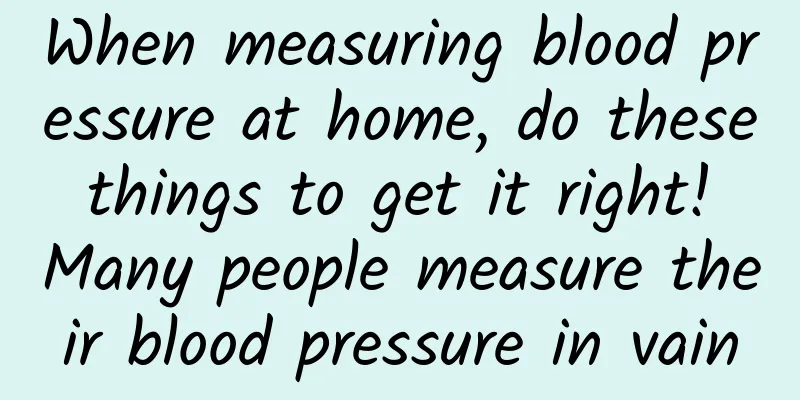When measuring blood pressure at home, do these things to get it right! Many people measure their blood pressure in vain

|
As hypertension becomes a common chronic disease, home blood pressure monitoring is becoming increasingly important. However, many people measure their blood pressure at home, resulting in inaccurate results due to improper operation, wasting measurement time and energy. To obtain accurate blood pressure data, you must pay attention to the following key points. Preparation before measurement Rest in peace 30 minutes before measuring blood pressure, be sure to avoid strenuous exercise, emotional excitement, smoking, drinking or drinking caffeinated beverages. These behaviors can excite the sympathetic nerves, causing blood pressure to rise in a short period of time, affecting the accuracy of the measurement. For example, if you measure blood pressure right after climbing the stairs, the blood pressure value will often be higher. You should rest in a quiet environment for 15-30 minutes to stabilize your body and create conditions for accurate measurement. Emptying the bladder A full bladder will affect blood pressure and interfere with the measurement results. Be sure to empty your bladder before measuring to relax your body and reduce the interference of additional factors on blood pressure. Many people ignore this and the measured blood pressure is not the real level. Choosing the right blood pressure monitor Electronic blood pressure monitors are the first choice for home measurement because of their easy operation and intuitive readings. Choose an upper arm electronic blood pressure monitor that has been certified by international standards to ensure its accuracy. Wrist blood pressure monitors are greatly affected by limb position and have relatively large measurement errors. They are not recommended for routine use unless in special circumstances (such as when the arm cannot be used) and under the guidance of a doctor. Although mercury blood pressure monitors are accurate, they are complicated to operate and require professional training. There is also a risk of mercury contamination, so they are not recommended for general families. Measurement process specifications Correct sitting posture When measuring, you should sit on a chair with a backrest, place your feet flat on the ground, and let your arms hang naturally on the table so that the blood pressure cuff is at the same level as your heart. If your arm is too high, the blood pressure will be too low; if it is too low, the blood pressure will be too high. For example, some patients are accustomed to placing their arms randomly, resulting in large deviations in blood pressure data. Only by maintaining a correct sitting posture can you get reliable blood pressure values. Wear the cuff properly The cuff should be tied on the upper arm, 2-3 cm from the elbow, and the tightness should be such that 1-2 fingers can be inserted. If it is too tight, the blood pressure measurement value will be too low, and if it is too loose, it will be too high. The size of the cuff is also important. You should choose the appropriate size according to the thickness of your arm. The standard cuff is suitable for arm circumferences of 22-32 cm. If the arm circumference exceeds 32 cm, a large size cuff should be used, otherwise the measurement accuracy will be affected. Averaging multiple measurements When measuring blood pressure for the first time, both arms should be measured, and the side with higher blood pressure should be used as the standard. Each measurement should be repeated 2-3 times, with an interval of 1-2 minutes, and the average value should be taken as the measurement result. Single measurement is easily interfered by accidental factors, and averaging multiple measurements can reduce errors and be closer to the actual blood pressure level. For example, the first blood pressure measurement is 140/90mmHg, the second is 135/85mmHg, and the third is 138/88mmHg. The average value of 137.7/87.7mmHg is taken as the measurement result. Record after measurement After measuring blood pressure, the data should be recorded promptly and accurately, including the measurement date, time, measurement site (left arm or right arm), blood pressure value, and physical condition during measurement (such as whether medication is taken, whether there is any discomfort, etc.). Detailed records help doctors fully understand the pattern of blood pressure changes and provide a strong basis for diagnosis and treatment. Some patients do not record their blood pressure after measurement, and cannot provide accurate blood pressure information when they go to the hospital for treatment, which affects the doctor's judgment of the condition. Measuring blood pressure at home may seem simple, but it actually requires many precautions. Only by making good preparations before measurement, standardizing the measurement process and accurately recording can you obtain reliable blood pressure data and provide effective support for health management. |
<<: Can patients with kidney disease smoke? What are the dangers of smoking?
>>: There is a "sea" in the palm: the road to rebirth of a girl with hyperhidrosis of hands
Recommend
Will cervical polyps recur?
Cervical cyst is actually a very common cervical ...
What shampoo should pregnant women use?
For pregnant women, the products they use must be...
How to identify Mingqian tea and why is it expensive?
Mingqian tea is generally the tea picked before t...
A brief discussion on small bumps in the vulva
Female is just a name compared to male, and the f...
Menstruation 12 days early
First of all, if menstruation comes 12 days early...
What are the sequelae of hysterectomy?
Some female friends may need to have their uterus...
This low-calorie slimming fruit is safe for diabetics to eat! It’s the perfect time to eat it now
What fruit should you not miss in May? Cherries a...
How to treat dermatomyositis? What should we pay attention to in daily life?
Author: Wu Donghai, Chief Physician of China-Japa...
Can drospirenone ethinyl estradiol tablets regulate menstruation?
Drospirenone ethinyl estradiol tablets are a rela...
How to discharge a lot of blood during menstruation
Adult women have menstruation every month. The am...
Is it harmful if I don't create a file when I'm about to give birth?
Many people know that when a pregnant woman is th...
What are the benefits of drinking red wine for women?
Women are like red wine, mellow, mysterious and e...
What is the cause of back pain and bloody vaginal discharge?
Do female friends usually experience back pain? I...
Spring is coming! Temperatures in Beijing continue to rise, so there are some things to pay attention to when exercising in spring
China Weather Network reported that today (Februa...









